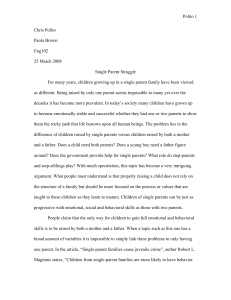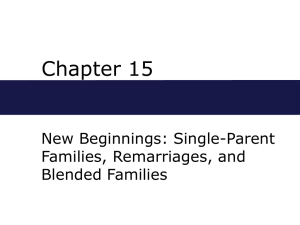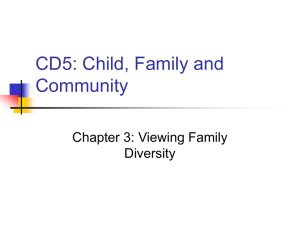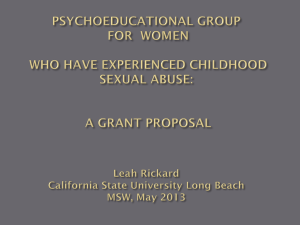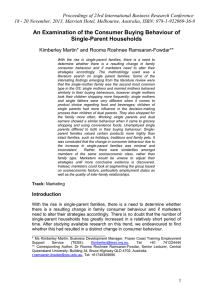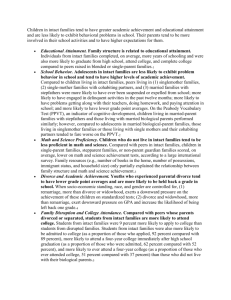Single-Parent Family -
advertisement
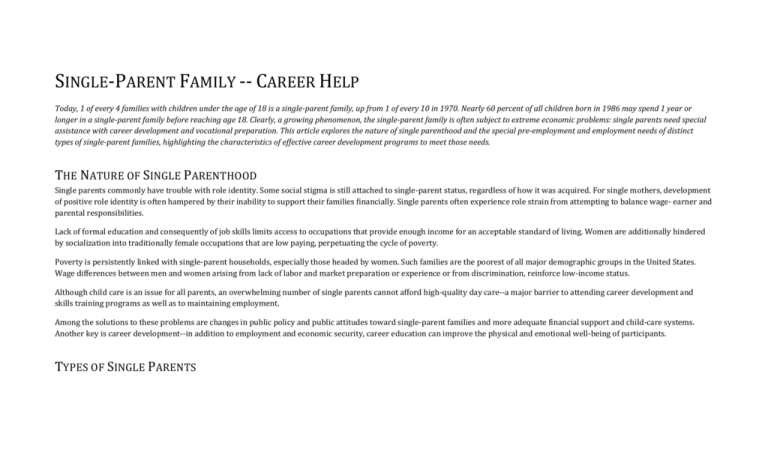
SINGLE-PARENT FAMILY -- CAREER HELP Today, 1 of every 4 families with children under the age of 18 is a single-parent family, up from 1 of every 10 in 1970. Nearly 60 percent of all children born in 1986 may spend 1 year or longer in a single-parent family before reaching age 18. Clearly, a growing phenomenon, the single-parent family is often subject to extreme economic problems: single parents need special assistance with career development and vocational preparation. This article explores the nature of single parenthood and the special pre-employment and employment needs of distinct types of single-parent families, highlighting the characteristics of effective career development programs to meet those needs. THE NATURE OF SINGLE PARENTHOOD Single parents commonly have trouble with role identity. Some social stigma is still attached to single-parent status, regardless of how it was acquired. For single mothers, development of positive role identity is often hampered by their inability to support their families financially. Single parents often experience role strain from attempting to balance wage- earner and parental responsibilities. Lack of formal education and consequently of job skills limits access to occupations that provide enough income for an acceptable standard of living. Women are additionally hindered by socialization into traditionally female occupations that are low paying, perpetuating the cycle of poverty. Poverty is persistently linked with single-parent households, especially those headed by women. Such families are the poorest of all major demographic groups in the United States. Wage differences between men and women arising from lack of labor and market preparation or experience or from discrimination, reinforce low-income status. Although child care is an issue for all parents, an overwhelming number of single parents cannot afford high-quality day care--a major barrier to attending career development and skills training programs as well as to maintaining employment. Among the solutions to these problems are changes in public policy and public attitudes toward single-parent families and more adequate financial support and child-care systems. Another key is career development--in addition to employment and economic security, career education can improve the physical and emotional well-being of participants. TYPES OF SINGLE PARENTS Many single-parent families are low-income families consisting of a mother and her young children. Three major subgroups of one-parent families have also been identified: displaced homemakers, adolescent mothers, and single fathers. DISPLACED HOMEMAKERS Marital dissolution drastically reduces the new single-parent family's available income. Displaced homemakers are at an additional disadvantage because they often have little or no employment history, obsolete training or skills, low self-esteem, and external locus of control. ADOLESCENT MOTHERS Each year in the United States, 1 in 10 teenage girls becomes pregnant. This vast subgroup of single parents faces many obstacles to self-sufficiency, such as lack of education, job readiness, and emotional maturity. Their crucial need to complete their education and achieve employment goals is complicated by their immediate needs for food, housing, child care, and emotional support. SINGLE FATHERS Although they generally have a more healthy economic status than their female counterparts, single fathers often find their sole child-rearing role conflicting with work expectations. They also find themselves filling social roles for which they are not prepared. CAREER DEVELOPMENT NEEDS OF SINGLE PARENTS As the sole support of their families, single parents are concerned with obtaining a good job and achieving economic independence. However, job training and job placement can be effective in the long run only if other needs are also addressed. The following needs should be considered: Emotional support (counseling, peer groups, assistance with developing support systems) Job-seeking skills Outreach and recruitment Child care Analysis of the role of gender in occupational choice Self-concept building Skills assessment The challenges of combining work and family roles Nontraditional job skills Parenthood education CAREER DEVELOPMENT PROGRAMS Meeting the needs of the many types of one-parent families is a major social challenge. Following are some examples of types of career development programs for single parents. HIGH SCHOOL DROPOUT PREVENTION Pregnant teens and teen parents are special targets for dropout prevention. Effective programs should include basic skills as well as occupational preparation, accurate information and guidance related to sexuality and family planning, prenatal and family life instruction, and support networks of teachers and peers who can assist with low self-esteem, time and stress management, and long- and short-term goal setting. Pregnant teens and teen parents can participate in alternative high school programs or they can be mainstreamed into regular classrooms. Established Education Sites Many single parents may feel more comfortable in the adult education atmosphere provided in area vocational centers and community colleges. These established sites already offer such services as basic literacy instruction, personal and career counseling, assistance for reentry students, and job placement. Child-care centers at these sites would overcome one of the major barriers for single parents returning to school.
